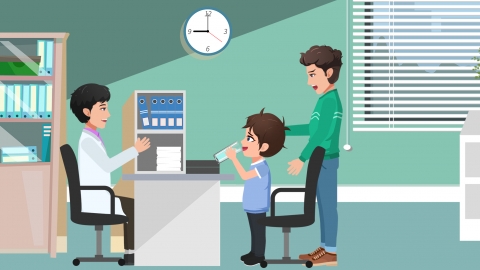What should be done if a child constantly keeps clearing their throat?
Generally speaking, the term "throat" refers to the pharynx. A child constantly clearing their throat may be related to habitual movements, dry throat, throat muscle tension, allergic rhinitis, or enlarged adenoids. It is recommended to seek timely medical attention and follow the doctor's guidance for general treatment, medication, or other treatment methods. Specific analyses are as follows:

1. Habitual Movement
A child may develop the habitual action of frequently clearing their throat due to imitating others. Parents are advised to patiently guide the child, explain the disadvantages of frequent throat clearing, and encourage the child to express discomfort in appropriate ways.
2. Dry Throat
Remaining in a dry environment for extended periods or insufficient water intake can cause dryness of the throat mucosa, leading to discomfort and prompting the child to clear their throat repeatedly to alleviate the discomfort. It is recommended to use a humidifier appropriately to maintain moist indoor air.
3. Throat Muscle Tension
When a child feels nervous, anxious, or experiences emotional fluctuations, the throat muscles may involuntarily tense up, causing frequent throat clearing. It is recommended to create a relaxed and pleasant living environment for the child and avoid excessive stress.
4. Allergic Rhinitis
Allergic rhinitis is usually triggered by allergens such as dust mites and pollen irritating the nasal mucosa. These allergens induce an inflammatory response in the nasal mucosa, resulting in excessive nasal secretions that may flow into the throat, irritating the throat mucosa and causing the child to clear their throat frequently. This is usually accompanied by symptoms such as nasal congestion, runny nose, and sneezing. Treatments may include medications like azelastine fluticasone nasal spray, cetirizine drops, and triamcinolone acetonide cream, as directed by a physician.
5. Enlarged Adenoids
Adenoid enlargement is typically caused by repeated episodes of acute or chronic nasopharyngitis. Inflammation stimulates the adenoids to proliferate and enlarge, blocking the nasopharynx, affecting breathing, and causing the child to clear their throat frequently. Symptoms often include nasal congestion, snoring during sleep, and mouth breathing. Treatment options may include medications such as amoxicillin-clavulanate potassium granules, montelukast sodium chewable tablets, and mometasone furoate nasal spray, as recommended by a doctor.
In daily life, maintaining humid indoor air and increasing fluid intake appropriately can help alleviate throat discomfort.




